 The Social Science Library will be closing at 7.00pm today.
The Social Science Library will be closing at 7.00pm today.
The Library will re-open at 9.00am tomorrow, Tuesday 17 March.
This early closing is due to a staff shortage. We apologise for any convenience caused.

The University has launched a new carbon target, to halve peak emissions by 2030. This will be challenging, but we can all do something to help.
 Here in the SSL we have been working to reduce the energy consumption of our electrical equipment by switching off some photocopiers and PCs during low use periods, setting the photocopiers to sleep after a few minutes’ inactivity and enabling power saving settings on staff PCs. We have reduced PC monitor brightness and we turn off monitors when not in use. Low energy LED lights with motion sensors have been installed throughout the library thanks to an ongoing Estates Services project to convert all the lighting in the Manor Road Building to LED. This has reduced the amount of electricity used to light the library by two thirds.
Here in the SSL we have been working to reduce the energy consumption of our electrical equipment by switching off some photocopiers and PCs during low use periods, setting the photocopiers to sleep after a few minutes’ inactivity and enabling power saving settings on staff PCs. We have reduced PC monitor brightness and we turn off monitors when not in use. Low energy LED lights with motion sensors have been installed throughout the library thanks to an ongoing Estates Services project to convert all the lighting in the Manor Road Building to LED. This has reduced the amount of electricity used to light the library by two thirds.
Here are our top tips for how you can help save energy in the SSL:
Be inspired and informed by our Climate Change Book Display located around the corner from the SSL Issue Desk.
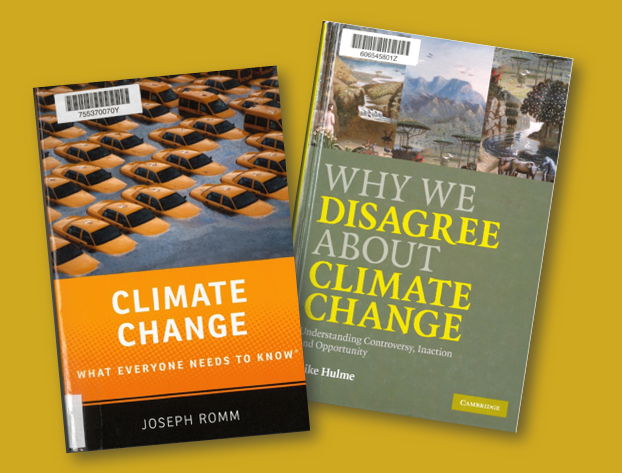 The books have been chosen by our Subject Consultants and cover African Studies, Economics, Forced Migration, Geography, International Development, International Relations, Politics and Sociology. They are just a small selection of the books we hold on climate change – to find more books on this topic, search SOLO.
The books have been chosen by our Subject Consultants and cover African Studies, Economics, Forced Migration, Geography, International Development, International Relations, Politics and Sociology. They are just a small selection of the books we hold on climate change – to find more books on this topic, search SOLO.
We can all make individual changes to our behaviour but by joining with others we can do more and have fun. You could sign up for Student Switch Off at your college or take part in Green Impact via your department or college. Find out more about these and other initiatives run by the University’s Environmental Sustainability Team at https://sustainability.admin.ox.ac.uk/get-involved
…
If you are struggling to find a book, room or service in the Social Science Library, look out for these sources of help:
 Library map – consult the large map in the Library entrance area or pick up a map from the Issue Desk to use in the library. You will also find the map on the ends of the shelves in the main aisle of the library and as a PDF on our website.
Library map – consult the large map in the Library entrance area or pick up a map from the Issue Desk to use in the library. You will also find the map on the ends of the shelves in the main aisle of the library and as a PDF on our website.
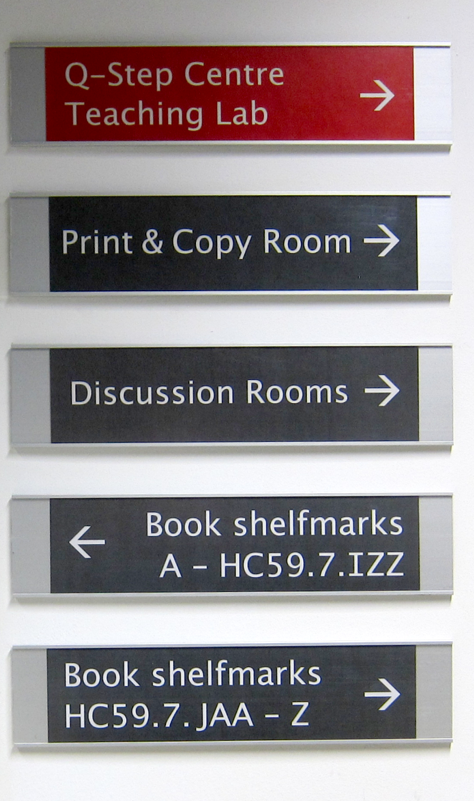 Signs – look out for these signs to point you to the different rooms in the library.
Signs – look out for these signs to point you to the different rooms in the library.
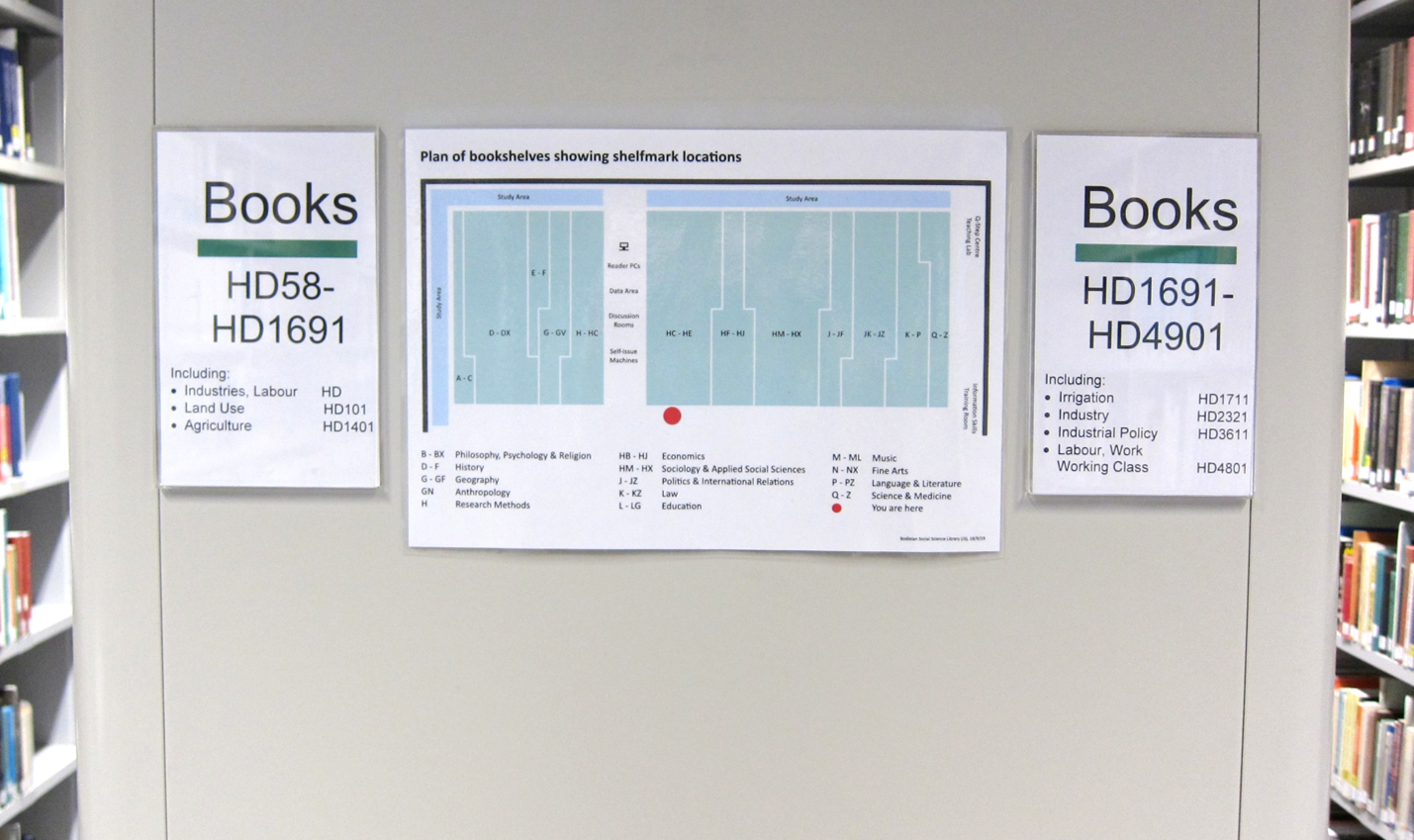 Plan of the bookshelves – use this to find the general location of your book (and see how far you need to walk…)
Plan of the bookshelves – use this to find the general location of your book (and see how far you need to walk…)
Stack end signs – these tell you the range of shelfmarks on that side of the shelves.
 How to…Understand shelfmarks poster – if you have ever wondered what the letters and numbers in the shelfmark of your book actually mean, then take a look at this poster. It also explains how books are ordered on the shelf, eg the first line of numbers are whole numbers and so the order is 1, 2, 10, 15, 150, 1200 …
How to…Understand shelfmarks poster – if you have ever wondered what the letters and numbers in the shelfmark of your book actually mean, then take a look at this poster. It also explains how books are ordered on the shelf, eg the first line of numbers are whole numbers and so the order is 1, 2, 10, 15, 150, 1200 …
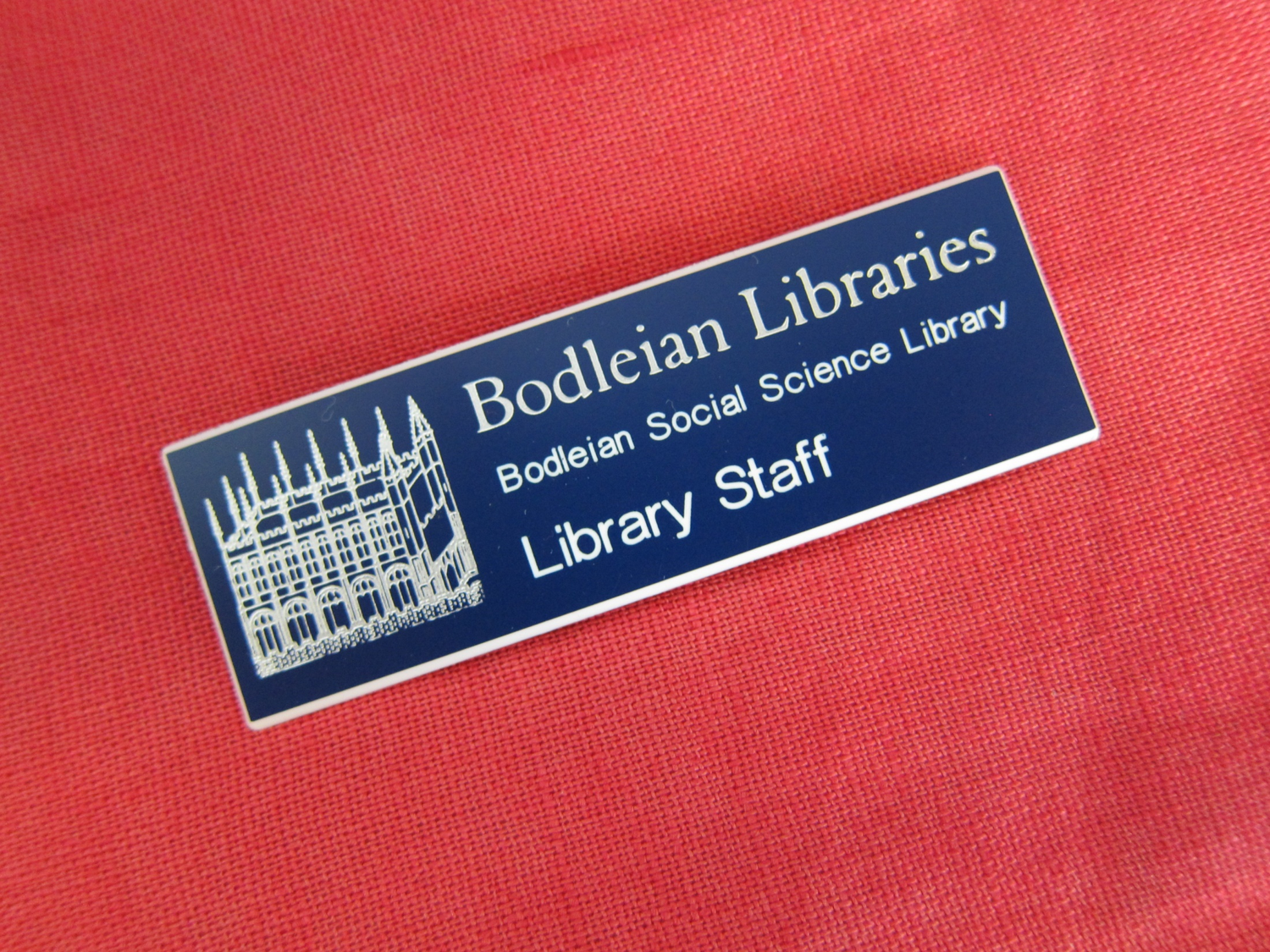 Library staff – we are always happy to help. You can find us at the Issue Desk, or out and about in the library replacing books on the shelves.
Library staff – we are always happy to help. You can find us at the Issue Desk, or out and about in the library replacing books on the shelves.
 There may be some infrequent drilling noise audible within the Library from 20 August to 10 September 2019. This is due to lighting replacement work taking place on the upper floors of the Manor Road Building.
There may be some infrequent drilling noise audible within the Library from 20 August to 10 September 2019. This is due to lighting replacement work taking place on the upper floors of the Manor Road Building.
Most of the drilling will be completed by 9.00am each day.
Please ask staff for advice on the quietest spaces to work in the Library during this time.
 Our entry gate swipe card reader has now been converted to a card proximity reader which uses the SALTO system. To enter the library, simply hold your University card or Bodleian Libraries card over the SALTO card reader for a couple of seconds. The light will turn green and the entry gate will open.
Our entry gate swipe card reader has now been converted to a card proximity reader which uses the SALTO system. To enter the library, simply hold your University card or Bodleian Libraries card over the SALTO card reader for a couple of seconds. The light will turn green and the entry gate will open.
 On Monday 15 July, the Social Science Library’s entry gate will be converted from a swipe-based access control system to a card proximity reader, using the SALTO system also used in many other buildings across the University.
On Monday 15 July, the Social Science Library’s entry gate will be converted from a swipe-based access control system to a card proximity reader, using the SALTO system also used in many other buildings across the University.
The library’s accessible entrance, currently operated using electronic tags issued to specific users, will also be converted to SALTO at the same time.
While the work takes place, please show your University/Bodleian Libraries card to staff in order to enter the library.
When the work is complete, simply hold your card over the new card reader, the light will turn green and the entry gate will open.
 On Monday 24 June, the Social Science Library’s entry gate will be converted from a swipe-based access control system to a card proximity reader, using the SALTO system also used in many other buildings across the University.
On Monday 24 June, the Social Science Library’s entry gate will be converted from a swipe-based access control system to a card proximity reader, using the SALTO system also used in many other buildings across the University.
The library’s accessible entrance, currently operated using electronic tags issued to specific users, will also be converted to SALTO at the same time.
While the work takes place, please show your University/Bodleian Libraries card to staff in order to enter the library.
When the work is complete, simply hold your card over the new card reader, the light will turn green and the entry gate will open.
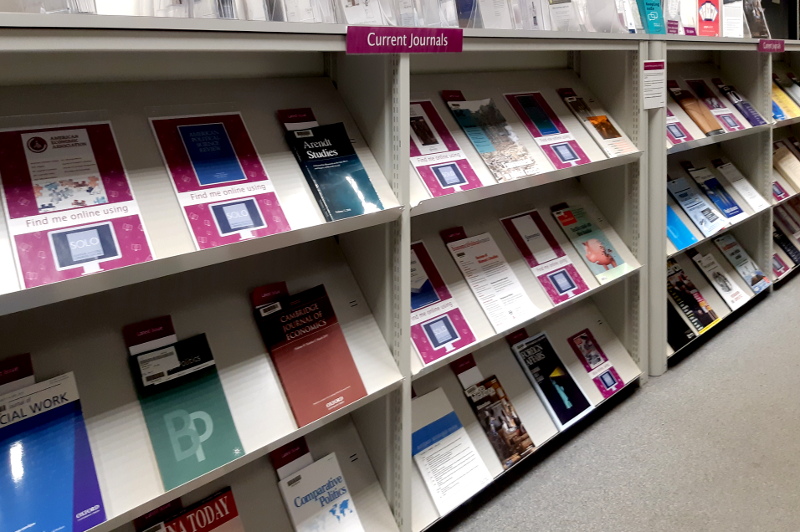 We have redesigned our Current Journals Display, located in the main aisle of the library – not only is it more colourful but we have also added a selection of our online journals.
We have redesigned our Current Journals Display, located in the main aisle of the library – not only is it more colourful but we have also added a selection of our online journals.
Open Access journals are clearly identifiable and popular weeklies received in print (New Statesman, The Economist) are easy to find.
Our Current Journals Display provides a flavour of the titles received across the subject areas supported by the Social Science Library. To check if we subscribe to a particular journal please search SOLO.
If there is a journal title that you would like to see on our Current Journals Display, or that you would like us to subscribe to, please tell us.
 Lighting the library and running equipment such as PCs, photocopiers and laptops are two of the SSL’s most significant environmental impacts due to carbon dioxide emissions resulting from electricity generation.
Lighting the library and running equipment such as PCs, photocopiers and laptops are two of the SSL’s most significant environmental impacts due to carbon dioxide emissions resulting from electricity generation.
We are currently reducing the environmental impact of our lighting by replacing all the ceiling lights with energy efficient LED lights. This is part of a University of Oxford Estates Services project to improve lighting efficiency throughout the Manor Road Building. Around 1,100 lights have been replaced in the building so far out of about 4,000. The new LED lights use less than half the electricity of the old fluorescent lights and we estimate that this is currently saving 40,700 watts. This equates to switching off 626 of the old lights. Further energy savings are being achieved by new motion sensors in library study areas which automatically turn off the lights when no readers are present.
We have also taken many steps to reduce the impact of electrical equipment in the library, such as programming the photocopiers to sleep after a few minutes of inactivity and turning some equipment off during periods of low demand, but we need your help to do more!
Here are seven simple things you can do to help save energy in the SSL:
These may seem like small actions, but collectively they can add up to make a big difference. Thank you for your help in greening the SSL and please do tell us your top energy-saving tips.
For further tips, a fun way to test your climate change knowledge, and a chance to win 50 tubs of ice cream for your college, try the NUS/University of Oxford Student Switch Off Climate Change Quiz which we are proud to support.
See the Greening the SSL web pages to find out more about what we have been doing to improve the library’s environmental sustainability.
To learn more about the University’s work on energy saving and carbon management see the annual Environmental Sustainability Reports.
We are pleased to announce that the Brookings Internally Displaced Persons (IDP) Archive can now be consulted by readers in the Weston Library. The Bodleian Libraries acquired the Brookings IDP archive in 2017, in close collaboration with the Refugee Studies Centre (RSC). Cataloguing was generously funded by the Swiss Federal Department of Foreign Affairs. The archive, covering the period 1983-2012, includes papers relating to the Guiding Principles on Internal Displacement which were launched in 1998.
 The most recent issue (59) of Forced Migration Review (FMR), available online and in print in the SSL, marks the 20th anniversary of these Guiding Principles and focusses on both their successes and limitations.
The most recent issue (59) of Forced Migration Review (FMR), available online and in print in the SSL, marks the 20th anniversary of these Guiding Principles and focusses on both their successes and limitations.
The Brookings IDP archive also includes papers and audio-visual material relating to the Representative of the UN Secretary-General (RSG) on internally displaced persons, covering the RSG’s interactions with individual countries, and the RSG’s relationship with the United Nations and non-governmental organisations.
The archive, which complements the unique refugee-related collections held in the SSL, can be searched via the catalogue and the documents consulted in the Weston Library.